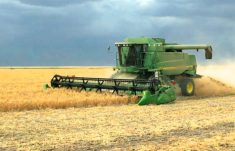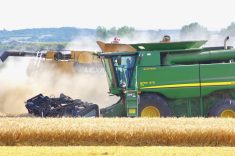MarketsFarm — Falling feed grain prices in Western Canada have not hit the bottom just yet, especially as harvest delays lead to quality downgrades.
“I would say it’s coming down quite a bit more,” said Mike Fleischhauer of Eagle Commodities in Lethbridge.
The barley and wheat harvests are running behind normal in both Saskatchewan and Alberta, with more rain over the past week causing further delays. As a result, there is still a large amount of grain to come off the fields, some of which farmers will be looking to unload off of the combine.
Read Also

U.S. grains: Soybeans, wheat plummet from highs on limited Chinese demand
Chicago soybean and wheat futures took a nosedive on Thursday, retreating from multi-month highs, as signs of only limited Chinese purchases from the United States tempered optimism about fresh demand following a bilateral trade truce.
The later harvest likely means more wheat will be grading as feed, with downgrades to barley quality also likely and an increased risk of frost damage.
While adverse conditions may hurt quality, total grain production is still expected to be large overall.
While there are pockets of drought and other areas dealing with excess moisture, Fleischhauer said there were also plenty of bumper crops.
Statistics Canada estimated Canada’s 2019 barley crop at 9.99 million tonnes, which would be well above the 8.38 million tonnes grown the previous year and the five-year average of 8.1 million tonnes.
Feed barley in southern Alberta’s Feedlot Alley is currently priced around the $205-$210 per tonne area, with some offers already coming in below the $200 per tonne mark, according to Fleischhauer. That compares with prices that had topped out in the $290-$300 per tonne range in June.
On top of seasonal harvest pressure weighing on prices, “we don’t have any international markets for barley and wheat,” said Fleischhauer.
While solid exports had cut into domestic supplies over the past year, Canada’s diplomatic dispute with China has caused that demand to dry up.
— Phil Franz-Warkentin writes for MarketsFarm, a Glacier FarmMedia division specializing in grain and commodity market analysis and reporting.















